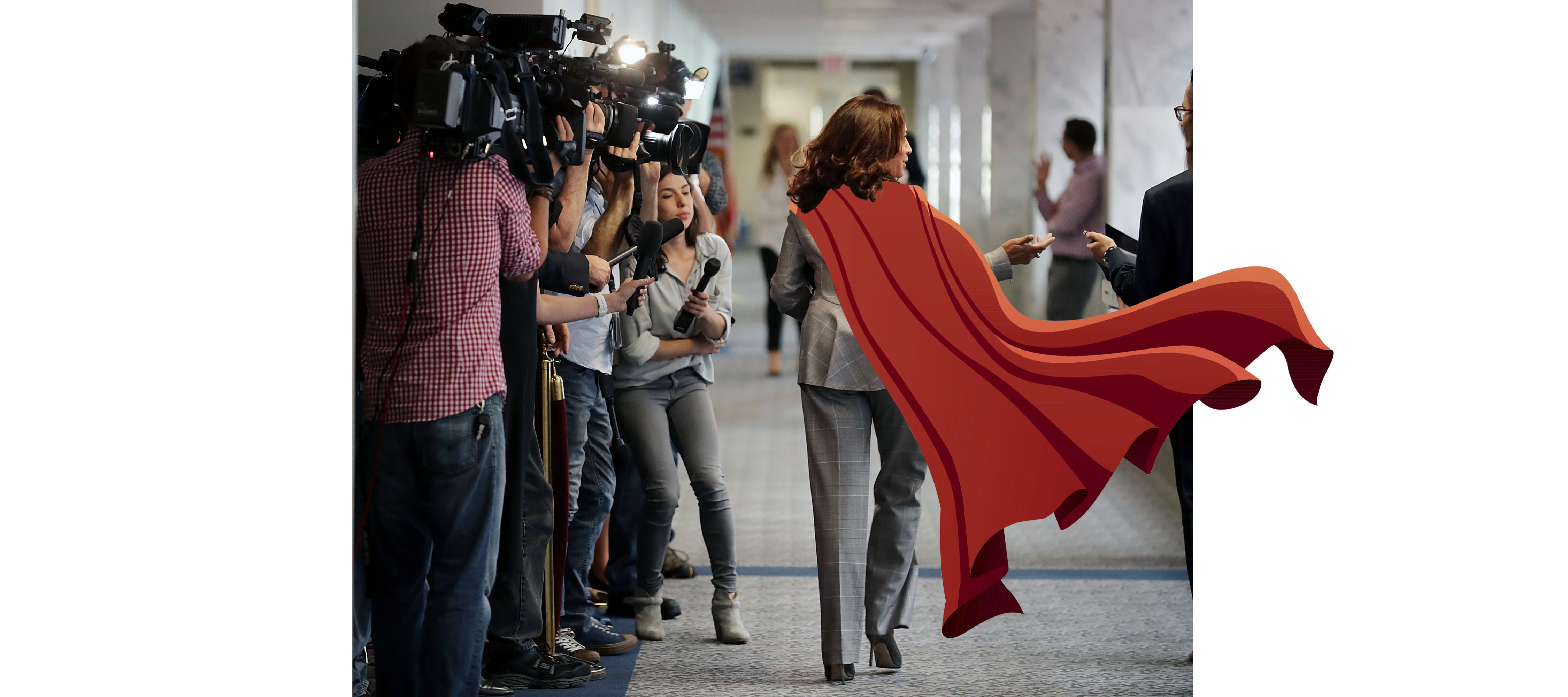The rise of the political she-ro
How today's female politicians became modern heroines


A free daily email with the biggest news stories of the day – and the best features from TheWeek.com
You are now subscribed
Your newsletter sign-up was successful
In the days after President Trump's inauguration, I was thrilled to find a black T-shirt that features Wonder Woman delivering a bone-splintering jab to Trump's jaw. As I've worn this shirt out in public, I've found that it expresses more than just my own punkish rage: Almost every woman I've encountered, however casually, has reacted to it. A barista took a close-up photo of my chest and turned it into her Facebook profile picture. The owner of my local laundromat gave me a vigorous head-nod and a thumb's up. And the little girl in line behind me at Panera told me, in a conspiratorial whisper, that she hates Trump too. All of this suggest that the meme is a kind of convex mirror, reflecting the light of a collective desire back to the world through a very specific set of images — in this case, the (quite literally) empowered woman as champion, delivering the world from ethno-nationalist thuggery with one clean hit.
Though we may pine for Themiscyra, home of the Amazons, we live in the He-Man Woman-Hater's Club that is Trump's America: The indignities of knowing that a self-confessed "pussy grabber" might be able to stack a Supreme Court that could turn this country into an Atwoodian hellscape have eroded women's faith across the nation (a recent Pew report states that only 29 percent of American women have "quite a lot of confidence" in the country's future). So, it is unsurprising, then, that images of the woman hero have become more pervasive, and more personal: Women have cried over Wonder Woman's "No Man's Land" sequence, carried protest signs bearing Princess Leia, and changed their social media avatars to Rosie the Riveter. However, in the Trump era, the iconography of the heroine — defender of truth, justice, and the innocent — doesn't just apply to the fictive warrior. Recently, real-life public figures like Sen. Kamala Harris (D-Calif.), Sen. Elizabeth Warren (D-Mass.), and ousted acting Attorney General Sally Yates, women who have each come out swinging at Trump and Trumpism, have become pop culture demi-goddesses — civil servants in pantsuits and sensible shoes now meme-i-fied, merchandized, and commodified like comic book bad-asses.
This trend isn't exactly unique — if anything, it seems like a natural extension of the cheeky "Notorious RBG" meme, which marries the contradictions between the octogenarian Supreme Court justice's diminutive body and the outsized, cut-a-bitch ferocity of her mind. However, the memeing of Kamala Harris as Wonder Woman and Daenerys Targaryen, and Sally Yates as Katniss Everdeen; the #ShePersisted swag (you can order an Elizabeth Warren crop top, since the "Yaaaaaas Yates" tote bag is now sold out); and the endurance of #ShePersisted itself, in all its incarnations, through a cyclone of news cycles, isn't quite so cutesy or wry. Though they are, on their surface, a needed celebration of the feminine heroic — women who would snare mendacious foes in the lassos of truth, shoot arrows at a wicked Capitol, singe the oppressor in righteous flame, or simply persist amid forces that are hell-bent on making her sit down and shut up — they are also manifestations of a trapped-animal rage that calls for nothing less than a real hero to avenge it.
The Week
Escape your echo chamber. Get the facts behind the news, plus analysis from multiple perspectives.

Sign up for The Week's Free Newsletters
From our morning news briefing to a weekly Good News Newsletter, get the best of The Week delivered directly to your inbox.
From our morning news briefing to a weekly Good News Newsletter, get the best of The Week delivered directly to your inbox.
Writing for Slate, Katy Waldman compares Warren and Harris with the Eumenides, "three goddesses tasked with protecting the cause of justice. They originally redressed wronged womanhood." Waldman likens these women (and I would certainly add Yates) to internet-age Eumenides, "summoned by the blood of Hillary Clinton, formed from liberal feminists' desire for a reckoning." So, when Senate Majority Leader Mitch McConnell (R-Ky.) formally censured Warren during now-Attorney General Jeff Sessions' Senate confirmation hearing — "She was warned. She was given an explanation. Nevertheless, she persisted." — he performed the feminist version of gunning down Batman's parents. He gave her an origin story, a personal mythos that can easily be weaponized (one can already imagine the "Warren 2020: Persist" bumper stickers), but that has already taken off — like a bird, like a plane — far beyond her status as a mere mortal, into the cultural stratosphere. "Nevertheless, She Persisted," is now, quite literally, an episode of Supergirl, in which the titular heroine must slug it out with her cousin, the more powerful Man of Steel.
Though the message of militant persistence is part of that feminist reckoning — one that isn't just borne out in memes of Ripley, Buffy, and Imperator Furiosa in all their grit and glory, but in the record numbers of women now running for public office — it also acknowledges that persistence is necessitated by the presence of a formidable opposition. An opposition that will often prevail — as evidenced by Warren's censure, Harris being shushed and told to "be more courteous" at two separate Senate hearings, and, of course, by Yates' firing. The picture that creates a symbiosis between Sally Yates with Katniss Everdeen is so poignant because the roots of each woman's ballyhooed fortitude spread in the hard soil of untenable choices — Yates' decisions to warn the White House about Michael Flynn and to stand down on enforcing Trump's Muslim ban, and Everdeen's instinctual rush to take her sister's place in the Hunger Games. Those of us who did not will Trumpism into power now live in the arena, dodging boobytraps of the (real) fake news, slugging it out against legislation that would wholesale destroy us, and wondering if our everyday allies — our co-workers, neighbors, and even family — are really the enemies who stabbed us in the back with their ballots. Sally Yates became a bona fide folk heroine because, like all good heroines, she let us vicariously live our own fantasies of sticking it to Trump (in ways that phone calls to our senators simply can't) while further affirming our own values of decency, integrity, honor, and compassion — and in this, reminding us that there can be triumphs, even in defeat.
As they are reconfigured into a pop cultural context, figures like Warren, Yates, and Harris become both agents of righteous vengeance and survivors of institutional misogyny. Harris was memed as "Kamala of House Harris, first of her name, the Unburnt, Queen of the Congressional Hearings" after she flustered Sessions, an avatar of Southern-fried racial aggression, into admitting that he "was nervous," (before he was rescued by the Republican colleagues who demanded Harris show "courtesy"). Hell, I even shared a clip of Daenerys standing in the temple of the dosh khaleen, smirking at the assorted khals who threaten her for talking back to them (or, you know, not being "courteous"), as she tips over a series of giant metal torches. I captioned it as "live video from today's congressional testimony."
Just as Daenerys, the Unburnt, the Uncourteous, rises naked from the ash, Harris weaponized her colleagues' condescending smarm by tapping into the frothing indignation of every working woman, especially every woman of color, who has been told she's too loud, too rude, who has been quieted to preserve some less competent white man's eggshell ego. On her professional Facebook page, Harris ran a fundraising ad for Act Blue that featured her in close-up, standing cheek-to-cheek with Warren; the call to action hinged on their shared status as champions of the small folk who had been wronged by another kind of khalassar, the old white boys' club: "The women of the United States Senate will not be silenced when seeking the truth. Fight back." Ironically, this dichotomy between power and vulnerability is at the root of Daenerys' appeal as well: She starts Game of Thrones as a beggar princess, wed off to a warlord before she discovers her birthright as the fireproof Mother of Dragons; even then, with the equivalent of three sentient nuclear weapons literally soaring at her side, the men she encounters continually underestimate her (much to their rather charred chagrin).
A free daily email with the biggest news stories of the day – and the best features from TheWeek.com
It's tempting to dismiss this heroine-worship as shallow and frivolous, the internet's incarnation of the pink pussy hat or the "fearless girl" statue. Still, conflating the real women fighting the real battles, the hard battles, the often destined-to-fail battles against systemic corruption and oppression with our pop cultural deities affirms that there are parts of our culture that value (or are at least preoccupied with) persistent, uncourteous women. However, the list of real-life women who get to stand on the pedestal with Supergirl and Katniss and Daenerys still reflects our social shortcomings — Warren, Yates, and Harris are all able-bodied, cis-gendered women. The intersection between our hero worship and our creative drive must get far broader.
Each of us, individually, will never have the power to leap tall buildings in a single bound, or break the patriarchy's jaw in a single punch. And neither, of course, will Elizabeth Warren or Sally Yates or Kamala Harris. But their meme-i-faction speaks — or, rather screams out — to our culture's fixation on the woman warrior in triumph and defeat. As very public figures who have stood strong and pushed back against the nuclearized misogyny that powers Trumpism — even (perhaps especially) when that resistance, that persistence, has led to their very public diminishment — they are our new heroines, extensions of the TV and movie warriors who may be able to take down the Capitol in only four movies, or swoop on dragon-back to claim the Seven Kingdoms, but who can't save us from the very present terrors of living in America, at least not in the way that a senator or an acting attorney general can.
Laura Bogart is a featured writer for Salon and a regular contributor to DAME magazine. Her work has appeared in The Atlantic, CityLab, The Guardian, SPIN, Complex, IndieWire, GOOD, and Refinery29, among other publications. Her first novel, Don't You Know That I Love You?, is forthcoming from Dzanc.
-
 How the FCC’s ‘equal time’ rule works
How the FCC’s ‘equal time’ rule worksIn the Spotlight The law is at the heart of the Colbert-CBS conflict
-
 What is the endgame in the DHS shutdown?
What is the endgame in the DHS shutdown?Today’s Big Question Democrats want to rein in ICE’s immigration crackdown
-
 ‘Poor time management isn’t just an inconvenience’
‘Poor time management isn’t just an inconvenience’Instant Opinion Opinion, comment and editorials of the day
-
 The billionaires’ wealth tax: a catastrophe for California?
The billionaires’ wealth tax: a catastrophe for California?Talking Point Peter Thiel and Larry Page preparing to change state residency
-
 Bari Weiss’ ‘60 Minutes’ scandal is about more than one report
Bari Weiss’ ‘60 Minutes’ scandal is about more than one reportIN THE SPOTLIGHT By blocking an approved segment on a controversial prison holding US deportees in El Salvador, the editor-in-chief of CBS News has become the main story
-
 Has Zohran Mamdani shown the Democrats how to win again?
Has Zohran Mamdani shown the Democrats how to win again?Today’s Big Question New York City mayoral election touted as victory for left-wing populists but moderate centrist wins elsewhere present more complex path for Democratic Party
-
 Millions turn out for anti-Trump ‘No Kings’ rallies
Millions turn out for anti-Trump ‘No Kings’ ralliesSpeed Read An estimated 7 million people participated, 2 million more than at the first ‘No Kings’ protest in June
-
 Ghislaine Maxwell: angling for a Trump pardon
Ghislaine Maxwell: angling for a Trump pardonTalking Point Convicted sex trafficker's testimony could shed new light on president's links to Jeffrey Epstein
-
 The last words and final moments of 40 presidents
The last words and final moments of 40 presidentsThe Explainer Some are eloquent quotes worthy of the holders of the highest office in the nation, and others... aren't
-
 The JFK files: the truth at last?
The JFK files: the truth at last?In The Spotlight More than 64,000 previously classified documents relating the 1963 assassination of John F. Kennedy have been released by the Trump administration
-
 'Seriously, not literally': how should the world take Donald Trump?
'Seriously, not literally': how should the world take Donald Trump?Today's big question White House rhetoric and reality look likely to become increasingly blurred
